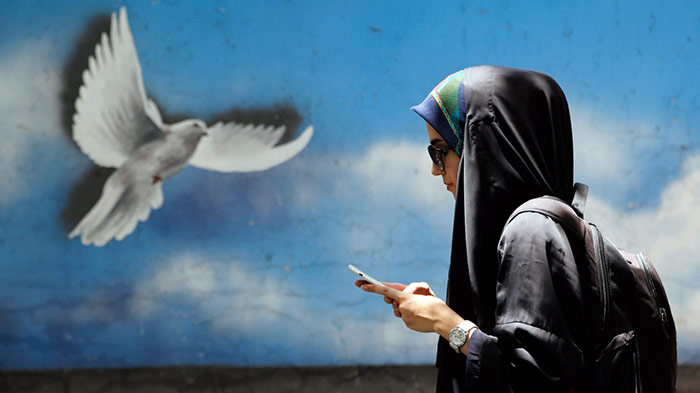"More than 5K followers? Enter Your Full Name" Rules Iran’s Internet Panel

On Monday, Iranian media outlets quoted Telecommunications Ministry officials that channels on social networks with more than 5000 members will soon have to obtain license.
“Given the fact that people should be able to trust news published in these channels, it has been decided that those with a certain number of members should be required permits,” Telecommunications Minister Mahmoud Vaezi said, as quoted by Tasnim News Agency. According to a new motion passed by the Iranian Supreme Council of Cyberspace, Culture Ministry is bound to establish a committee within a month and prepare the directives that decide the minimum number of members that will require licensing.
This came a day after prominent cleric and Tehran’s interim Friday Prayers leader Mohammad-Ali Movahedi Kermani warned of the online mores that have the potential to uproot Islam. Also chairman of the “Enjoining Good and Forbidding Wrong” Headquarters of Tehran Province, a moral supervision authority, Movahedi Kermani made headlines and hashtags over what he called rampant ‘tele-sex’ over the internet. “In the cyberspace, we see many girls who publish their nude photos, an act of online and tele-sex, unfortunately prevalent in the country,” Asr Iran quoted Movahedi Kermani as saying. Speaking to the members of the headquarters, he prioritized cyberspace over elections and hijab, and promised discussion on a proposed bill in the panel’s next meeting to be held three months from now.
Mahmoud Vaezi’s announcement have raised concerns about freedom of expression online. Perhaps the most serious backlash came on Telegram, which initially seemed to be the sole target of the plan. However, a culture ministry official told Iran Daily that the plan is not even limited to Telegram. “News, entertainment, [and] advertisement channels and pages on social networks [and apps] including domestic ones such as Salam Up, Soroush, BisPhone, Cloob, Syna, etc. and foreign ones like Telegram and Instagram with more than 5 thousand users, followers or members must be registered and authenticated,” said Deputy Culture Minister for Communications Technology and Digital Media Ali-Akbar Shirkavand. He added that a website will soon be launched for admins of these “channels” to register and continue their activities after authentication. “They will all be rated in respect of their contents and the number of users/followers, as [other countries] do and publish the best pages and channels,” Shirkavand told Iran. Critics fear that the enforcement of the law might also affect artists, celebrities, and independent journalists on the personal social media accounts.
Iran’s Cyber Police (FATA) officials have also expressed hope that the culture ministry will launch the website within two weeks. FATA chief, Brigadier General Kamal Hadianfar said on Wednesday that Telegram tops the number of cybercrimes among mobile social networks. “The platform for 66 percent of the crimes [committed on cyberspace] is Telegram, while Instagram accounts for 20 percent and less than 2 percent is observed on WhatsApp,” ISNA quoted him as saying.
The Rouhani administration has been under pressure also from judicial officials over easy access to the Internet. On Tuesday, Iran’s attorney general Hujjat al-Islam Mohammad-Jafar Montazeri slammed an authority workgroup in charge of defining criminal online contents for its laxity in response to what he called anti-religion networks. “Down with the freedom that is destroying everything” he exclaimed. “This is absolute enslavement,” Iranian media quoted Montazeri who was speaking of the under-controlled public access to the Internet.
Opponents of the newly announced decision are criticizing the Rouhani administration over the plan. Many call it an embarrassment for the administration that claims to advocate freedom of expression. “If the number of birds sitting on a wire exceeds one hundred, the wire should obtain a license,” reads a sarcastic tweet. President Rouhani insists that his administration has remained committed to preserve social networks in spite of pressures, as stressed in his Twitter account’s reply to IT Iran that had objected the blocking of Telegraph, a new Telegram service that allows channels to run stories just like the mainstream media.
Similar restrictive plans have been proposed in the past. Ahmadinejad’s administration launched a similar website in 2007 in order to exercise more control on websites and blogs. Whether for lack of infrastructure and also backlash among media circles, the plan was soon abandoned. Iran has repeatedly said it is working on what it calls national internet, a nation-wide intranet feared to deprive people of access to websites hosted abroad.
Apart from moral concerns and bids of censorship, huge money also seems to be at stake. Shirkavand pointed out copyright problems, which have caused many abuses. He also noted that small businesses are selling smuggled and “immoral” goods on these channels and thus the act could protect the rights of individuals.
FATA’s Hadianfar has also told reporters that a case of online gambling has been under investigation over the past year with a turnover of 23 billion tomans (roughly more than $6m). More than 3323 gambling channels have been identified and 184 are arrested with their bank accounts confiscated he announced.

